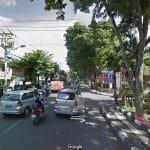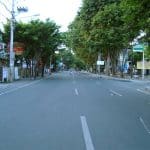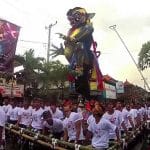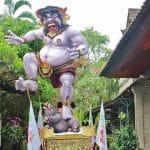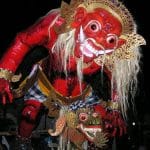
If you visit Bali around the month of March, you will most likely be informed about Nyepi. You may hear some people complaining about things they cannot do during the Balinese Day of Silence. You cannot turn on the lights, should not be wandering around even in your own neighborhood, and all kinds of businesses are shutting down for at least 2 days. Maybe, it is even the first time you will hear that there’s a big international airport closed down for a whole day! You might be wondering: how will I eat? What if I need room service in my hotel? What if I get ill so bad and need to go to the hospital?
Now, before freaking out, let us have a look at the meaning of Nyepi, it’s effects on all people staying during Nyepi, and how to turn the limitations into something…well, less limited. In fact, quite a lot of people enjoy the peace during Nyepi, just like us Balithisweek crews. Read also Kathleen‘s Nyepi experience, as reflected in her article on Huffington Post.
First, please read the following citation from Wikipedia,
Nyepi, a public holiday in Indonesia, is a day of silence, fasting and meditation for the Balinese. The day following Nyepi is also celebrated as New Year’s Day. The same day celebrated in India as ugadi.
Observed from 6 a.m. until 6 a.m. the next morning, Nyepi is a day reserved for self-reflection, and as such, anything that might interfere with that purpose is restricted. The main restrictions are no lighting fires (and lights must be kept low); no working; no entertainment or pleasure; no traveling; and, for some, no talking or eating at all. The effect of these prohibitions is that Bali’s usually bustling streets and roads are empty, there is little or no noise from TVs and radios, and few signs of activity are seen even inside homes. The only people to be seen outdoors are the Pecalang, traditional security men who patrol the streets to ensure the prohibitions are being followed.
Although Nyepi is primarily a Hindu holiday, non-Hindu residents and tourists are not exempt from the restrictions. Although they are free to do as they wish inside their hotels, no one is allowed onto the beaches or streets, and the only airport in Bali remains closed for the entire day. The only exceptions granted are for emergency vehicles responding to life-threatening conditions and women about to give birth.
It does seem quite difficult to stay in Bali during Nyepi with all those limitations. But fear not, as we will presenting some Nyepi myth-busters as well as explain why you can casually stay.
[lists style=”style4″ line=”0″]
- Nyepi is only for Balinese, therefore I don’t need to follow their rules.
It is correct that Nyepi is only for Balinese, but the rules are absolute throughout the island. As stated, the only exception is for emergency situations. If you really cannot follow them, the only way is to be outside of the island. Most people will go to either Lombok or Java. Be warned that ferry crossing will be very crowded a few days before and after Nyepi, and flights are fully booked.
On the other side, Balinese Hindu is not the only belief that suggests peace. We don’t have to spend the whole day meditating without eating, but surely we can take the day for a self-reflection too, in our own ways. - Nyepi lasts for 2 nights and 1 day.
This is a misconception people might receive since most lights are turned off even on the night before Nyepi, but that is not necessarily should be done. As stated in the citation above, Nyepi lasts through 24 hours from 6.00 am to 6.00 am in the next day, and that means the ‘no light’ rule applies for 1 night only. - The electricity is cut during Nyepi.
That is not true. The electricity stays on during Nyepi. It is true that Pecalang patrolling your neighborhood to make sure no one is wandering around and there’s no speck of light can be seen from inside the house in the evening. However, you are still allowed to wander around inside your house (or apartment, villa, even hotel). That means you can do anything as usual as long as you stay inside and not making loud noises. In fact, it is okay to turn on a light or two, as long as the light cannot be seen from the outside. Do note that in the evening where the stars are the only source of light (Balinese calendar is based on moon cycle so a New Year means new moon and the moon is not visible), even the dim light of fire from a matchstick can be seen from afar. Just like the Pecalang’s flashlights, (which they carry during their patrol at night and light it up for a second or two from time to time) beam would seem like a music concert’s spotlight. - TV signal & internet during Nyepi.
While this is true as TV stations are closed and even digital subscriptions are cut (sometimes), but receiving TV broadcasts is not the only thing your TV is capable of. You can connect it to your home theater (or computer) and watch some movies while keeping the volume level as low as possible or channel the sound to a headset.
Phone and internet connection from both landline (including fiber optic) and wireless stays on. So you can make phone calls and use the internet to browse, play, or work as usual.
Update: since 2018, The Parisada Hindu Dharma Indonesia (PHDI), the country’s leading authority on Hinduism, is appealing to authorities to enforce telco providers to shut down internet services during Nyepi. In 2018, only a few internet providers comply with the request, but in 2019, most of them shut down the internet as the local government issue an official instruction. - All shops are closed.
Since amati karya (no working) is one of the essences of Nyepi, all business will be closed starting the day before, to 7 am after Nyepi. Some privately owned businesses also take this opportunity to closed down a few days before and after Nyepi, to a total of 1 week. - Lighting a fire ban is not for everyone
Not all Balinese family undergo the fasting, but some Balinese mothers would respect amati karya and amati geni (no fire) by cooking before Nyepi, for a 2 days worth supply.
Other people would have to cook their own food. Unless you want to follow the amati geni rule, of course, you are allowed to cook; if you have the equipments & ingredients, that is. Because of that, local supermarkets will be very crowded starting from around 1 week before Nyepi so it is recommended to get your groceries, toiletries, and maybe snacks, as early as possible. It is recommended to prepare food for at least 3 days since we don’t know if the nearby warung will open as soon as Nyepi is over. Also, check the gas level for your stove, and make sure you have a decent supply of clean water. - I see people other than Pecalang walking on the street.
In some rare cases, one might be allowed to leave their house for various reasons. For example, if Nyepi accidentally falls on Friday, Muslim people are allowed to attend the Mosque by walking from their home. There is also some neighborhood in Denpasar where during late in the afternoon, people are allowed to gather on the road to meet and even let the little kids play football on the vacant street. Of course, it is done under Pecalang supervision and everyone is prohibited to make loud noises. At dusk, they are asked to return home and back to respecting the rules of Nyepi.
Some lucky people, usually if they are personally close to the Pecalang or introduced by a respected local person in the neighborhood, they can ask permission to go outside and see how it feels to walk on empty streets under broad daylight (or middle of the night) and take some rare pictures. A Pecalang will escort him, and he is asked to return inside after the request is fulfilled.
Please take a look at the 2 images below, showing the main street of Diponegoro in Denpasar. The first image is taken from Google Street View, and you can see the bustling traffic. The second image is taken at the same spot during Nyepi, and you can see in the distance there are some children riding their bikes on the empty street.
- I stay in a villa/hotel.
Services at the hotels/villas should be running normally since only the Balinese workers taking the leave. The other workers would sleepover at the hotel. Or if their home is within walking distance, they can get a permit letter from the village so that they can walk to/from the hotel.
Depends on the type of villa/hotel and Pecalang’s strictness in the neighborhood, you may or may not be allowed to wander around even outside of your hotel room. In most cases, hotel guests are allowed to leave their room and go to the hotel’s restaurant, spa, and use the swimming pool or any other features in the hotel. Although it is very rare, there are some hotels which will be literally guarded by Pecalang. They will be patrolling along the hotel’s corridors and prevent everyone to go outside of their room unless it is urgent. Consult with your hotel before booking your room. - Emergency situations.
Ambulance and other emergency services are standing by during Nyepi. You can call them directly or request assistance to the nearest Pecalang you can find.
If you have a baby, you should tell the Pecalang and they will give you special permission to turn on the light.
[/lists]
There are other perks of staying in Bali during Nyepi, that is you get to see various kinds of Ogoh-ogoh as they are paraded on the streets the day before Nyepi. Since Ogoh-ogoh parade is started in the afternoon and last up to 10 in the evening, you can be able to see the parade only if you are staying for Nyepi (unless you already book a flight ticket for that night, and provided the flight is not canceled / you don’t miss the flight).
For more insight and tips, you can read this post on Lonely Planet website.
Every year, more and more hotels and villas offer special Nyepi packages. If you do intend to stay in Bali during Nyepi, you can try searching only by typing “Nyepi package” on Google, and you will get a lot of options. Additionally, we also list some special Nyepi packages offered by our partners below.

